US Citizen Fights for Russia in Ukraine: Exploring Motivations & Geopolitical Implications of Foreign Fighters
 Ukraine
Geopolitics
Ukraine
Geopolitics

Explore the complex motivations behind a US-linked individual fighting for Russia in Ukraine. This analysis delves into potential ideological, personal, and geo
Exploring Why US-Linked Individuals Fight for Russia in Ukraine
The ongoing conflict in Ukraine has unveiled a myriad of complex narratives, not least of which is the perplexing case of individuals with ties to Western nations, including the United States, choosing to fight on behalf of Russia. This phenomenon challenges conventional understandings of geopolitical alignment and personal loyalty, prompting a deeper examination into the motivations behind such choices.
Understanding why a person with American connections would join forces with Russia against Ukraine requires exploring a spectrum of potential factors. These can range from deeply held ideological convictions to personal disillusionment, or even purely mercenary incentives.
Ideological and Political Motivations
For some, the decision might stem from strong anti-Western sentiments or a belief in Russia's geopolitical narrative. Individuals may feel alienated by their home country's foreign policy, viewing Russia as a bulwark against what they perceive as Western hegemony or liberal degeneracy. This could involve an adherence to specific political ideologies that align with Moscow's rhetoric, such as certain strains of nationalism, anti-globalism, or even traditionalist conservatism. They might genuinely believe in Russia's stated objectives regarding the conflict, such as 'denazification' or protecting Russian-speaking populations.
Personal Disillusionment and Search for Purpose
Beyond overt political beliefs, personal circumstances often play a significant role. Some individuals may be veterans of previous conflicts, seeking the camaraderie and purpose that military life provides, especially if they feel disenfranchised or marginalized in civilian society. Others might be driven by a thirst for adventure or a desire to be part of a historical moment, regardless of the ideological implications. Disillusionment with their own government, economic hardship, or a lack of personal fulfillment could also push individuals towards extreme choices, where fighting for a foreign power offers a perceived sense of belonging or importance.
Recruitment and Propaganda
The influence of online propaganda and targeted recruitment efforts cannot be underestimated. Russian state media and affiliated online communities actively promote narratives that might appeal to disaffected individuals, presenting Russia as a righteous force against a corrupt West. Such platforms can provide a pipeline for recruitment, offering logistical support or financial incentives to those willing to join the fight. The promise of purpose, community, and even financial gain can be powerful motivators for those feeling adrift.
Legal and Ethical Implications
For a U.S. citizen, fighting for a foreign power, especially one engaged in hostilities with a nation supported by the U.S., carries severe legal ramifications. Such actions could potentially lead to charges of treason, violating the Neutrality Act, or other federal offenses upon returning to the United States. Ethically, it raises questions about allegiance and the responsibility of citizenship, particularly when one's actions contribute to a conflict deemed illegal by much of the international community.
The involvement of individuals with U.S. ties fighting for Russia in Ukraine serves as a stark reminder of the multifaceted nature of modern warfare and the complex interplay of personal conviction, geopolitical narratives, and the persuasive power of propaganda. It underscores the challenges in defining loyalty in an increasingly globalized and ideologically polarized world.